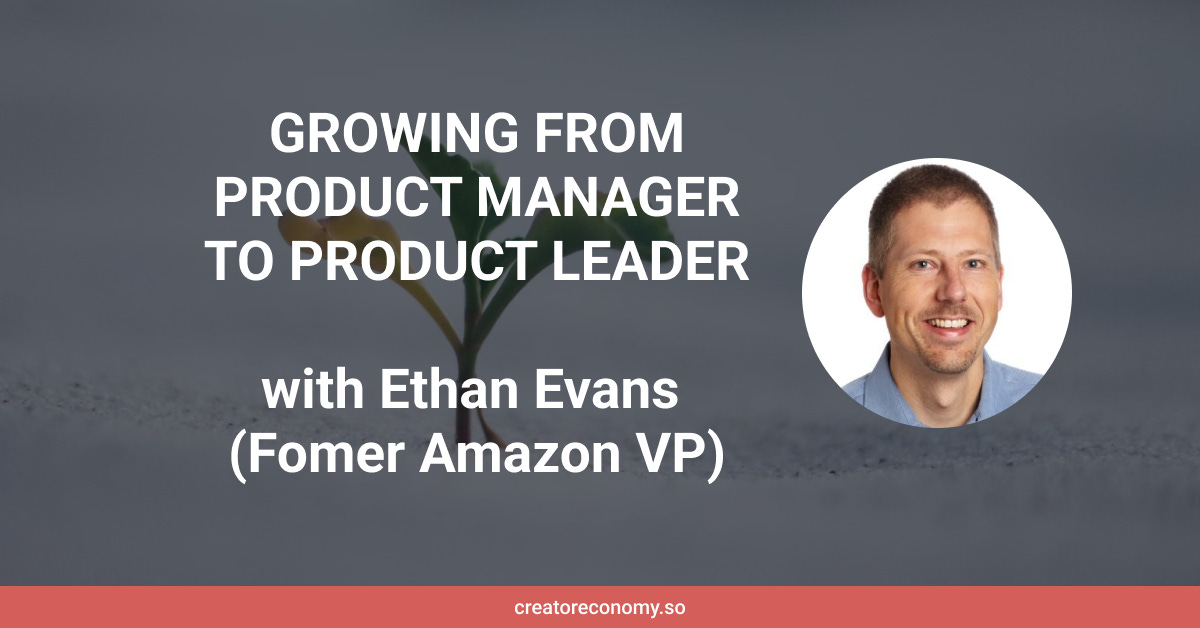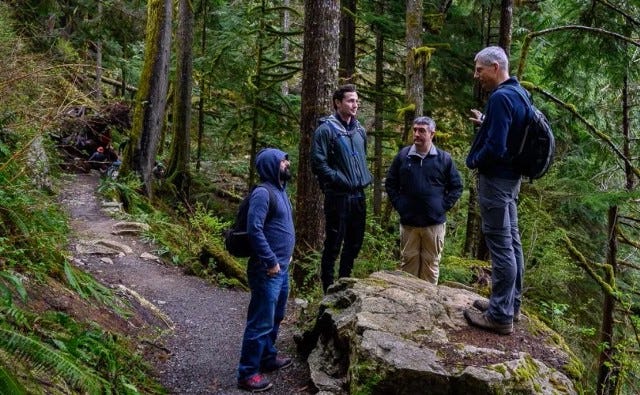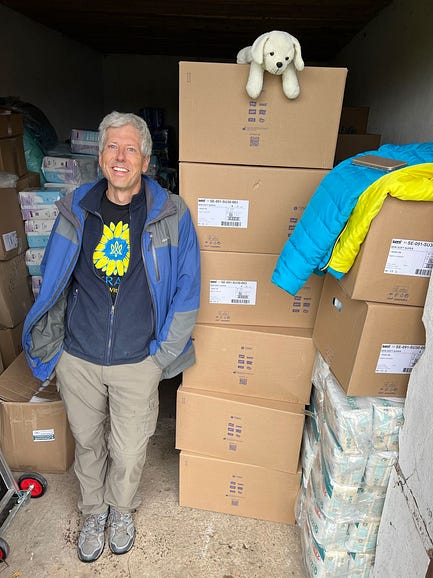Growing from Product Manager to Product Leader
Growing from Product Manager to Product LeaderHow to get promoted and navigate career setbacks with Ethan Evans (Ex-VP Amazon)Dear subscribers, There's a lot of advice out there for early career product managers. But mid-career PMs and managers often need more help. Ethan is a former Amazon VP and one of the best product leaders that I know. In the interview below, we cover:
This is one of the best interviews that I’ve done - let’s dive in! 👋 Two quick asks from me:
Now onto the interview… How to get promotedEthan, you joined Amazon as a senior manager and left as a VP over a decade later. What led you to succeed at the company? Thanks Peter. I think I had three traits:
Many people want to get promoted but feel stuck. Do you have any advice for them? If you want to get promoted, my advice is to:
Jeff Bezos had a saying:
This means being patient in achieving your goal, but also insisting on making progress every day. This is what I mean by patience and opportunism, plus a plan to invest in yourself. Do you have any advice for product managers specifically? Yes, PMs must excel in the following areas to get promoted:
One of the more difficult transitions to navigate is going from IC to manager. Do you have any advice for people making this transition? When people ask me if they should consider management, one of my first questions for them is what will motivate them to really learn a new profession. I try to open their eyes to the fact that they are leaving behind what they used to do as a designer, an artist, or a product manager to take on a new job with different skills and challenges. As a manager, you have to truly believe that your success comes through other people. I wrote about it more in this post. How to deal with setbacksHave you ever been laid off? I was laid off in the fall of 2003. It was about the worst timing that you could imagine. We were in a recession, but I had a good job. My wife and I were in the process of adopting a little girl from China. As the adoption date drew near, my wife, who also had a good job, left her role because we wanted to be present with our daughter. My workplace was struggling, but they knew that my adoption relied on me being able to show sufficient income to the US and Chinese governments. So in a strange kind of “kindness,” they delayed laying me off until we completed the adoption… and then laid me off as soon as I got back to the office.
I was already familiar with the book, What Color is Your Parachute. This book is phenomenal and I recommend it to anyone who needs a job. But, the key advice in my situation was “treat your job search like a job - work at it for 40 hours a week.” I immediately started putting a ton of time into my job search. I spent my day polishing my resume, networking, and reading books to tune up my skills. A silver lining of being out of work is that I was home with my daughter for three months after we got her. This was before maternity and paternity leave was standard. In the end, it was networking that saved me. I reconnected with an old manager who had a new startup. That startup was in a different city. When I landed an interview with an unrelated company in the same city, I told my old manager “I would be in town.” That conversation eventually got me a job. In many ways, getting laid off (fired really) was a blessing. It made me really look at what I failed to do that made the company willing to part with me. I’d been pretty abrasive in some of my interactions, and I think it was easy for some of the leaders there to decide that in a tight economy they could manage without me. This led me to change my behavior over time to become a much calmer, better executive. In closing, I will say that there is nothing like watching your bank account head to zero and counting the days to running out of money to focus you on a job search. I know for some people this might crush them. For me, it gave me the drive to find a job and luckily I did. In short, recovery was two things:
Have you ever worked on a project that was canceled? I’m lucky that my main work was never deprecated, though sometimes individual projects were killed. As a leader, I was often a part of the decision to kill projects (including at least one where we had to lay off some of the people). So, I think my experience may not be as relevant to those with less control over these decisions. There was one case where I had run out of good ideas for a team. The business was stuck in a rut, and I was being pushed to innovate and (in my opinion) magically make it better. Rather than fail at this task, I moved on. Successors did not succeed either, so I feel I made the right choice. The good thing about Amazon is that I could move internally than leave the company. Have you ever been reorged? Yes, I’ve been reorged multiple times. The most important lesson I can share here is that we all expect the worst. We fear that the new boss will be a bad person who will not understand or value us, who will want to bring in their own people, or who will have an incompatible style. But in fact, you actually have at least a 50% chance of getting a better boss in a reorganization. At Amazon, I got assigned new managers not of my choosing three times, and two of them are among the best managers I’ve had. So what I would advise people is to have their eyes open.
How to manage upTo build on that point, I’ve noticed that it’s not enough to just do the work as you become more senior. You have to be able to manage up and across to be effective. Do you have any advice about managing up effectively? Managers don’t want to manage you, they want you to manage them. Here’s how you can build a good relationship with your boss:
I wrote a longer post about managing up here. How to think about your careerYou had a 15-year career at Amazon, was there a time when you seriously considered leaving? There was at least one time I strongly considered leaving Amazon. I was trying to make the leap from Senior Manager to Director. It was unclear if or when it would happen, so I interviewed outside and got a good offer. I was always transparent with my boss, and I simply talked to him.
This was very polite and indirect, but also very clear. I was promoted, and my new compensation made the other offer much less attractive, so I stayed. Do you think people should always be casually looking for new opportunities? How do you know when it’s time to leave a job? I don’t believe that you should always be looking. I do believe you should always be building your network so that you have the ability to look quickly and effectively when you decide you need to. There are lots of reasons to build a network, so it isn’t all about getting a job, but networks are incredibly powerful when we do need a job. How do you know when to look for a new job? Some signs could include:
Wrapping upWhy did you choose to leave the corporate world to pursue your own coaching business? Was it stressful to be a VP? I left the corporate world because I wanted to spend more time helping people. At Amazon, my primary job was to run a business. Part of that was coaching and developing my team - mainly my direct reports and some “extra” time mentoring others. But now I’m free to put as much time as I want into speaking, writing, and coaching. Being a VP was certainly stressful, but I think it was even more stressful to be working toward the VP promotion. As a VP, I had a lot of challenging work to do. As a Director trying to become a VP, I had to worry about both the work and how it was being evaluated. While you would hope that those two things are the same, sometimes they are not You’re now a coach with amazing content on your blog, LinkedIn, and YouTube. How can people get in touch with you for coaching? Do you think all PMs should have some presence online? The easiest ways to reach me are through the contact link on my website or by messaging me on LinkedIn. I love to coach people and I particularly enjoy challenging situations as they force me to come up with creative solutions. It’s an online world today. A PM, or any professional, who is not investing at least something in the online world is ignoring a powerful tool. This does not mean that you have to be on every platform. Pick one that fits your style and leverage it. I’ve tried Twitch, YouTube, Twitter, and Instagram. Since I address a professional audience and I like the written format, I’ve found that LinkedIn works very well. So as I learned, I have focused 90% of my effort in one place. PMs know how to evaluate alternatives and determine product/market fit. Your expertise and the people you want to connect to are your product; find the “market” that fits you. You already know how to do this - you only need to apply the exercise to yourself. PMs should be some of the most natural people in the world to have incredible careers.
It is amazing how this idea is revolutionary to so many people, to think of themselves as the product. But every PM skill applies to ourselves. A product plan. A gap analysis. A marketing plan. A budget and an expected Return on Investment. On behalf of all my readers, thanks Ethan!
If you liked this post from Creator Economy by Peter Yang, why not share it? |
Older messages
How Creators Can Get Started with AI
Wednesday, October 5, 2022
How does AI work anyway and how you can start playing with AI tools now
From 6,000 to 60: Why We're Downsizing Our Community On Purpose
Wednesday, September 21, 2022
When it comes to community, larger isn't always better
Will AI Art Help or Hurt Artists?
Wednesday, September 7, 2022
Imagine creating a painting by typing a few sentences. I've been playing with AI art myself and it's mindblowing. Let's dive into: 1) What can AI art create? 2) How does AI art work? and 3)
Can NFTs Move From Speculation to Utility?
Wednesday, August 24, 2022
The last NFT bull run was dominated by speculation. So can NFTs move to provide real utility? Let's dive in.
Sign in to Creator Economy by Peter Yang
Saturday, August 13, 2022
. Here's a link to sign in to Creator Economy by Peter Yang. This link can only be used once and expires after 24 hours. If expired, please try logging in again here Sign in now © 2022 Peter Yang
You Might Also Like
🌎 Make international sourcing and shipping easier
Tuesday, March 4, 2025
How to prep your business for changing trade regulations. ͏ ͏ ͏ ͏ ͏ ͏ ͏ ͏ ͏ ͏ ͏ ͏ ͏ ͏ ͏ ͏ ͏ ͏ ͏ ͏ ͏ ͏ ͏ ͏ ͏ ͏ ͏ ͏ ͏ ͏ ͏ ͏ ͏ ͏ ͏ ͏ ͏ ͏ ͏ ͏ ͏ ͏ ͏ ͏ ͏ ͏ ͏ ͏
🦅 How was the masterclass with Arvid Kahl?
Tuesday, March 4, 2025
Your feedback matters + Access the recording ͏ ͏ ͏ ͏ ͏ ͏ ͏ ͏ ͏ ͏ ͏ ͏ ͏ ͏ ͏ ͏ ͏ ͏ ͏ ͏ ͏ ͏ ͏ ͏ ͏ ͏ ͏ ͏ ͏ ͏ ͏ ͏ ͏ ͏ ͏ ͏ ͏ ͏ ͏ ͏ ͏ ͏ ͏ ͏ ͏ ͏ ͏ ͏ ͏ ͏ ͏ ͏ ͏ ͏ ͏ ͏ ͏ ͏ ͏ ͏ ͏ ͏ ͏ ͏ ͏ ͏ ͏ ͏ ͏ ͏ ͏ ͏ ͏ ͏ ͏ ͏ ͏ ͏
Letter from the Editor: Why this year's Digiday Publishing Summit matters
Tuesday, March 4, 2025
It's a new era for the media industry. Eras, actually: There's the AI era, the streaming era, the podcast era, the post-cookie era. In other words, media companies are being forced to evolve,
11 social media skills to master (and how AI can help)
Tuesday, March 4, 2025
Perfect these skills now to stay ahead in 2025 ͏ ͏ ͏ ͏ ͏ ͏ ͏ ͏ ͏ ͏ ͏ ͏ ͏ ͏ ͏ ͏ ͏ ͏ ͏ ͏ ͏ ͏ ͏ ͏ ͏ ͏ ͏ ͏ ͏ ͏ ͏ ͏ ͏ ͏ ͏ ͏ ͏ ͏ ͏ ͏ ͏ ͏ ͏ ͏ ͏ ͏ ͏ ͏ ͏ ͏ ͏ ͏ ͏ ͏ ͏ ͏ ͏ ͏ ͏ ͏ ͏ ͏ ͏ ͏ ͏ ͏ ͏ ͏ ͏ ͏ ͏ ͏ ͏ ͏ ͏ ͏ ͏
🦅 The masterclass with Arvid Kahl starts in 15 minutes
Tuesday, March 4, 2025
Build In Public Without Giving Away Your Business Secrets ͏ ͏ ͏ ͏ ͏ ͏ ͏ ͏ ͏ ͏ ͏ ͏ ͏ ͏ ͏ ͏ ͏ ͏ ͏ ͏ ͏ ͏ ͏ ͏ ͏ ͏ ͏ ͏ ͏ ͏ ͏ ͏ ͏ ͏ ͏ ͏ ͏ ͏ ͏ ͏ ͏ ͏ ͏ ͏ ͏ ͏ ͏ ͏ ͏ ͏ ͏ ͏ ͏ ͏ ͏ ͏ ͏ ͏ ͏ ͏ ͏ ͏ ͏ ͏ ͏ ͏ ͏ ͏ ͏ ͏ ͏ ͏
The Age of Economic Chaos
Tuesday, March 4, 2025
Listen now (7 mins) | To investors, ͏ ͏ ͏ ͏ ͏ ͏ ͏ ͏ ͏ ͏ ͏ ͏ ͏ ͏ ͏ ͏ ͏ ͏ ͏ ͏ ͏ ͏ ͏ ͏ ͏ ͏ ͏ ͏ ͏ ͏ ͏ ͏ ͏ ͏ ͏ ͏ ͏ ͏ ͏ ͏ ͏ ͏ ͏ ͏ ͏ ͏ ͏ ͏ ͏ ͏ ͏ ͏ ͏ ͏ ͏ ͏ ͏ ͏ ͏ ͏ ͏ ͏ ͏ ͏ ͏ ͏ ͏ ͏ ͏ ͏ ͏ ͏ ͏ ͏ ͏ ͏ ͏ ͏ ͏ ͏ ͏ ͏ ͏
The next level of content marketing
Tuesday, March 4, 2025
Content marketing isn't just about creating blog posts. If you're still stuck in that mindset, you're leaving money on the table. The best marketers go beyond traditional content and
📱 Google Gemini’s iPhone Hack
Tuesday, March 4, 2025
AI More human-like than ever. Ready to upgrade? ⚡
ET: March 4th 2025
Tuesday, March 4, 2025
Exploding Topics Logo Presented by: Exploding Topics Pro Logo Here's this week's list of rapidly trending topics, insights and analysis. Topic #1 BlueChew (trends) Chart BlueChew is a
🦅 Masterclass with Arvid Kahl: watch the live stream
Tuesday, March 4, 2025
At 10:00 AM Eastern Time (US and Canada) ͏ ͏ ͏ ͏ ͏ ͏ ͏ ͏ ͏ ͏ ͏ ͏ ͏ ͏ ͏ ͏ ͏ ͏ ͏ ͏ ͏ ͏ ͏ ͏ ͏ ͏ ͏ ͏ ͏ ͏ ͏ ͏ ͏ ͏ ͏ ͏ ͏ ͏ ͏ ͏ ͏ ͏ ͏ ͏ ͏ ͏ ͏ ͏ ͏ ͏ ͏ ͏ ͏ ͏ ͏ ͏ ͏ ͏ ͏ ͏ ͏ ͏ ͏ ͏ ͏ ͏ ͏ ͏ ͏ ͏ ͏ ͏ ͏ ͏ ͏ ͏ ͏ ͏ ͏ ͏


